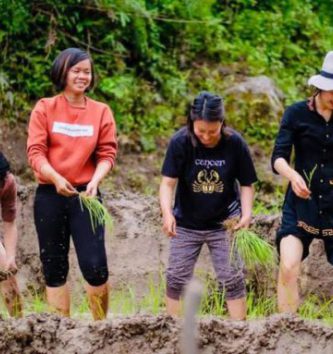Educated GNH Farmers Project in partnership with Sterling College, USA

The GNH Centre Bhutan aims to re-ignite youth interest in agriculture, by combining ecological farming opportunities with a GNH leadership training so that a new generation of “GNH Educated Farmers” can begin to view such livelihoods as part of a desirable and sustainable future for themselves, and their communities. In partnership with the Sterling College, USA the Centre aims to use the EcoGather Initiative platform to educate Bhutanese youth about the Wellbeing Economy, as well as the four pillars and nine domains of GNH. It is hoped this new collaboration will inspire young people to take up interest in practical farming approaches that will lead to financial security and peak their interest in farming as a viable and sustainable business.
With the recent COVID-19 pandemic situation, Bhutan has limited the import of food products when the borders were sealed off to curb the rates of rising infection cases. This was an opportunity for youth and farmers to take farming seriously and better understand the importance of their role in contributing to the nation’s economy.
To address food scarcity and complement the government's efforts in promoting agricultural practices, youth unemployment and the issues related to the farming sector in Bhutan, the GNH Centre Bhutan is partnering with Sterling College’s new EcoGather Initiative. The partnership comes at an opportune time and the two year partnership will focus on combining GNH leadership training and ecological farming initiatives. The project will include rural women and unemployed youth as the main beneficiaries of this project.
The GNH Centre Bhutan is one of five partners supported by Sterling College under the Egogather Initiative. The Ecogather Initiative is a collaborative and transformative learning network dedicated to the regeneration of ecosystems, communities, and economies. It is designed to help communities navigate the ecological crises and social challenges driven by extractive approaches to meeting human needs.
Bhutan experienced successful accelerated economic development activities for the last few years under the mindful values of Gross National Happiness by ensuring our natural resources are not abused at the risk of economic development. Despite the success, a large portion of Bhutan's population is still dependent on agriculture for their livelihood and financial sustenance, so ensuring the sustainability of the country’s food and nutrition sector is very important. Bhutan also imports a large part of its food from neighbouring India while still promoting agricultural activities within the nation.
Under this unique effort to promote agricultural efforts, GNH Centre Bhutan, the Maati-Paani-Asha Center in India, FrontLine Farming of Colorado, the Puerto Rico Trust for Science, Research and Technology, and The Center for an Agricultural Economy in Vermont are working together to share experiences and create a new narrative. Through EcoGather, the five communities will be working to recover community-centered agriculture practices. Also, it will enable us to compare the strategies, challenges, and successes in building transformative communities and food systems.
About Sterling College
Sterling College is a place-based, liberal arts institution that advances ecological thinking and action (ET&A) through affordable, experiential learning that prepares people to be knowledgeable, skilled, and responsible leaders in the communities in which they live. The College’s areas of curricular focus include agriculture, ecology, and education. Sterling recognizes that life on this planet is threatened by a worsening climate emergency of our own making and complicated by interlocking environmental and social crises. Our approach to addressing these challenges is grounded in ecological sensitivity, a deep commitment to equity, enduring empathy, and experiential education, the combination of which offers our best hope for transforming relationships within the natural world.
Related:
